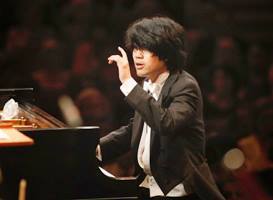|
Back
A Bridge Too Far New York
SubCulture, 45 Bleecker Street
03/17/2014 -
Alexander Scriabin: Valse, Opus 38
Frédéric Chopin:Impromptus: 1-4, Opus 29, 36, 51 & 66
Maurice Ravel: La Valse (Arranged for piano by Sean Chen)
Dan Tepfer: All I Heard Was Nothing
Sean Chen (Pianist), Dan Tepfer (Pianist)

S. Chen (© Timeline.com)
Dan Tepfer began his professional life as an astrophysicist, studied classical piano in Boston and Paris, and has been an award-winning jazz pianist many times. But after listening to Sean Chen perform the first work of the evening, Scriabin’s rare Valse, the confident Mr. Tepfer seemed a bit nonplussed.
“There’s nothing more fun,” he said with undisguised irony, “than following a virtuoso pianist.”
Maybe to other jazz players in the SubCulture audience, he hadn’t met his match. But this discovery of Sean Chen, even in a truncated recital was an astonishing evenings.
The recital of Sean Chen with “guest” Dan Tepfer, was an experiment to bridge two worlds of music. That bridge, though, was more like Chris Christie’s George Washington Bridge, open at one end, but blocked at the other.
Both pianists were winners of the American Pianists Association, which sponsored this show. Their experiment was for Mr. Chen to play all four Chopin Impromptus on the fine Steinway piano, each one to be followed by Mr. Tepfer doing his own “impromptu” jazz variation on the Chopin. (He had already done this in his recording of Bach’s Goldberg Variations, with jazz between each section.)
The problem was that Mr. Chen played the Chopin with such solid fingerwork, such impeccable technique, and such modest understanding that following this would be impossible for an Oscar Peterson, much less a Dan Tepfer.
Mr. Chen does not yet have, say, Claudio Arrau’s tenderness, his effortless magic to make the music speak for itself. But at the age of 23, and already the Third Place winner of the Van Cliburn Competition with many an orchestral concert to his credit, he made more than creditable statements. The first was played with an absolutely nimble abandon, eschewing rubato (perhaps only the most experienced players can pause without making it sound mawkish). The second was sadder but no less elegant.
The Fantaisie-Impromptu, with its middle “Rainbow Chasing” tune was given a splendid performance, lively, elegant–and like the others, a mighty challenge to Mr. Tepfer.
This was, of course, no piano competition. Mr. Tepfer part was to hear the Chopin by Mr. Chen (unfortunately weaving back and forth while it was played), then give his own jazz version.
To his credit, Mr. Tepfer retained the structures of the four, took fragments of each, gave them an almighty series of riffs, and accredited himself nicely. The problem was that one applauded and appreciated his technique and his 1970’s style sophisticated jazz style. But there was never any “there there.” Or perhaps it was my reactionary tendency to hear the Chopin as music fulfilled, while the jazz was, by definition, a work in progress.
Sean Chen began and ended the concert with the waltz. Actually two waltzes which were both astounding. He started with Scriabin’s Valse, written late in his career but showing little of the mystic atonal Scriabin. This was, as Mr. Chen explained, “not really a waltz”, but a work about waltzes. It leaned heavily on ravishing Ravelian waltzes (had Scriabin even heard Ravel?), on Lisztian flash, on some quirky Scriabin filigrees. Certainly easier for a neophyte audience than his etudes.
The last waltz was the one work of the evening which will always be remembered. Frustrated with the one- and two-piano transcriptions of Ravel’s La Valse, Mr. Chen took the orchestral score and other transcriptions, and made a piano piece which he felt was closest to the orchestral version.
“Then,’ he admitted, realizing that it was impossible to play on the piano, he began “to take out notes which couldn’t be played.”
That was a modest confession, for the work that he performed last night outdid any Ravel transcription I have ever heard. Sean Chen is no Cyprien Katsaris, turning music into near-impossible showpieces. The music he worked with was of course difficult, but one could hear the inner melodies, the grumbling basses, the shimmering violins.
All of it with that resonant, rich, rhythmic waltz meter which swings dizzily on a precipice, almost–but not quite–losing balance.
It was a “Whew!” moment, and I prayed that no simple encore would follow. Much as I want to hear Mr. Chen in a full recital (or his celebrated Bartók Second Concerto performance), anything further would have detracted from both the original transcription and the mesmerizing performance.
Harry Rolnick
|